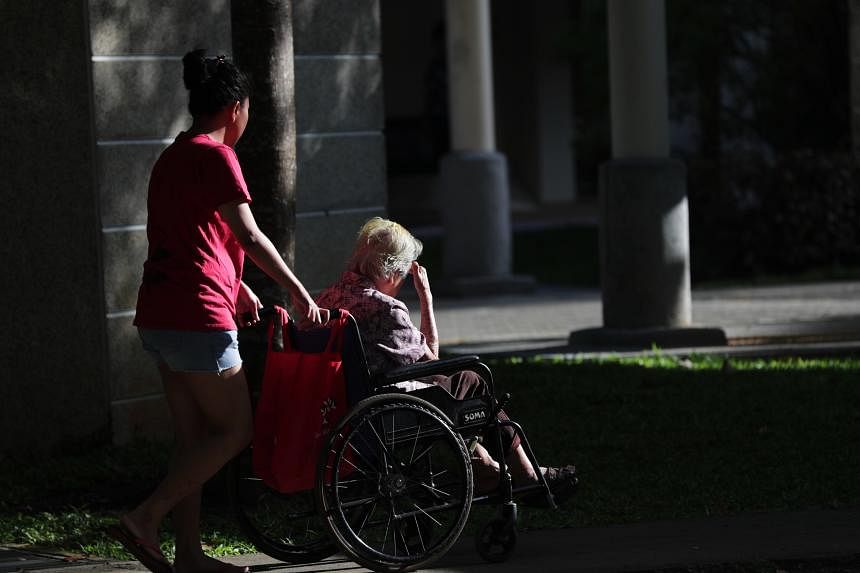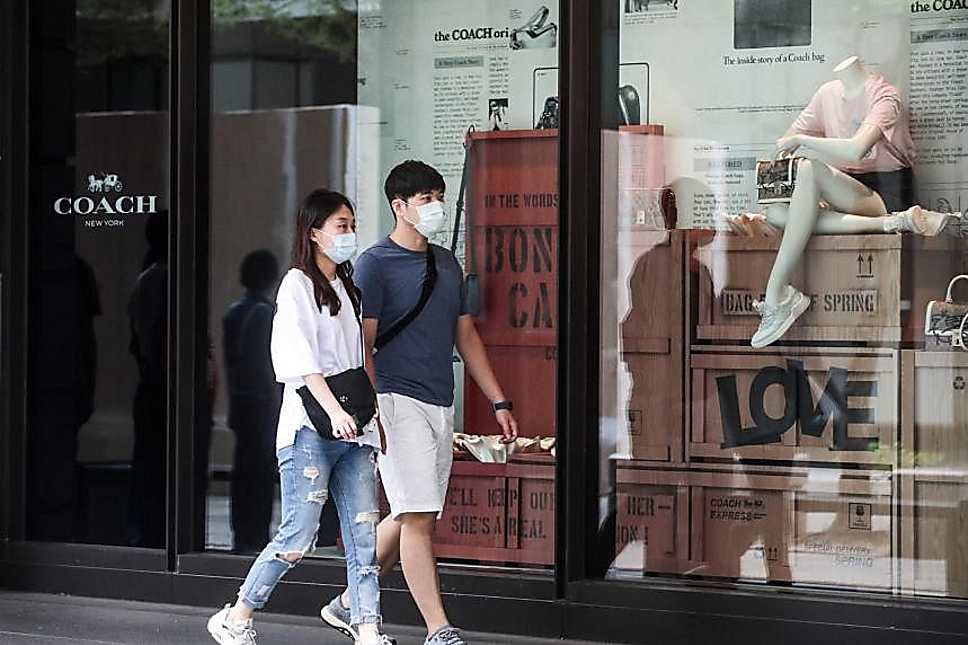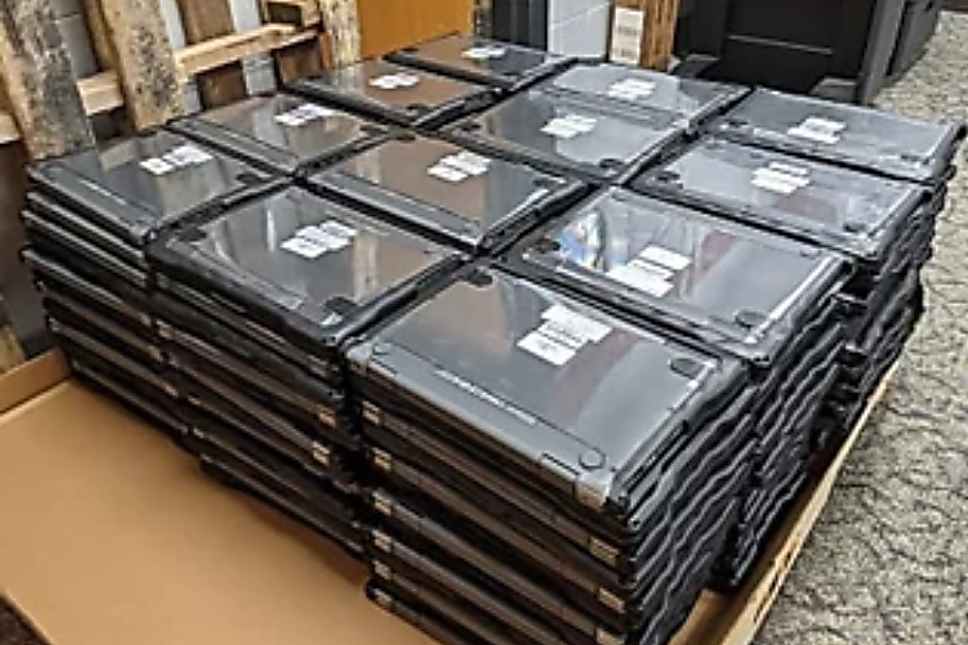Will I be able to find a caregiver like Ah Mi when I get old?
One in four Singaporeans will be over 65 by 2030. Besides building the ‘hardware’ of eldercare, Singapore needs to do more about the ‘software’ – for the sake of its people and the foreign workers we lean on for caregiving.

Mum died last month.
I mourn her passing but I am also thankful she is no longer in pain. At a frail 93, her quality of life had not been good the past few years.
Today, there is a strange bittersweet void in my life. As the unmarried daughter, much of my time was devoted to mum’s care, managing her medical appointments, ensuring there was enough Fresubin in the house, keeping track of her prescriptions, and a host of other seemingly small but essential matters – all while holding down a full-time job.
As the years of caregiving wore on, I felt exhausted, sometimes resentful and many times on the verge of breaking down. Most times, I felt very alone.
But I wasn’t alone.
I had the privilege of being able to afford a caregiver. Like many women in Singapore – and indeed, around the world – we have relied on other women to help manage our families. Without paid domestic helpers and caregivers, we would be barely functional as a nation.
The future of caregiving
My mother’s last years have made me think seriously about my future caregiving needs.
While the Government is getting the hardware in place by planning retirement homes, setting up eldercare centres and repurposing flats, something also needs to be done about the software, especially if people are being encouraged to age in place.
People need people. And today, we are heavily reliant on foreign workers to staff not only our homes, but also our healthcare sector. When mum was in and out of hospital, I saw first-hand how true this was.
We are also heavily reliant on luck. Everyone knows hiring the right helper or caregiver is a game of chance. Similarly, for the migrant domestic worker (MDW), finding the right employer is an intimidating and uncertain process.
Everyone in the chain is dependent on the luck of the draw, which also includes a scrupulous and ethical agency. All these stories can be found in Aware’s 2020 research report, Neither Family Nor Employee, which features in-depth interviews with 25 MDWs, four employment agencies, seven employers and five formal providers of eldercare training. Twenty per cent of the MDWs reported that the needs of their care recipients were different from what had been described by the agents and/or employers during the hiring stage. Of the 21 respondents who had interviews with their employers prior to hiring, 67 per cent were not asked about previous training and 62 per cent were not asked about their previous work experience in caregiving.
I lucked out with mum’s final caregiver. Sri Ayuni – or Ah Mi as she asked to be called – had spent six years in a nursing home in Taiwan and spoke fluent Mandarin. While she was mum’s caregiver, she also indirectly cared for me by allowing me breathing space to be myself, to be by myself.
I had hired her in the midst of Covid-19 restrictions when she was still in Indonesia. We met on a Zoom call, taken hurriedly before a work lunch appointment in Tanjong Pagar. I had Zoomed other potential caregivers but took a chance on Ah Mi because of her cheerful demeanour and kind eyes.
My gamble paid off. Not only did she know how to feed, bathe and move mum, she also knew how to engage mum in vocal exercises to strengthen her throat muscles for easier swallowing. When mum was in hospital, even the nurses were impressed. She was also incredibly patient, caring and responsible.
The luck of the draw
When mum passed, I wanted to personally make sure Ah Mi went to a good family that would value her. Instead of relying on agencies, I actively asked around my network of friends. And so, she ended up with a friend’s aunt desperately looking for someone to care for her father whose Parkinson’s had taken a turn for the worse. She had been at her wit’s end because agencies had not been able to help, as demand for caregivers continue to outstrip supply.
Again, luck played a good hand, for Ah Mi and my friend’s aunt.
But I don’t want to gamble on my future. Nor should workers from other countries be made to gamble with theirs when they choose to work in our country and our homes.
So, it is time to put a greater value on caregiving.
By 2030, one in four Singaporeans will be over 65. And the Asia-Pacific population is ageing faster than any other region in the world due to lower fertility and mortality rates, as well as longer life expectancy. According to the United Nations, there are now 630 million Asians aged 60 years or over, representing 60 per cent of the world’s older people. By 2050, their number is projected to increase to 1.3 billion, with the majority being women.
Will I be able to find an Ah Mi when I get old, someone trained properly to look after the elderly? Equally important, can we do better to empower women like Ah Mi who leave behind their own families to look after ours? Would they be able to get, besides a salary, something long term and useful in return for their labour?
Professionalising caregiving
Perhaps, one way is to give them official and professional recognition from a reputable institution that can raise their market value and set them up for a brighter future.
Currently, there are individual caregiving training programmes offered by different service providers under the Agency for Integrated Care. These are short lessons targeted at specific needs – for example, learning how to care for someone with diabetes or dementia. And they are aimed at employers who may or may not see the need to upgrade the skills of their helpers. However, private caregiving agencies like Homage also offer courses and training geared at people who want to become professional caregivers.
It would be great to leverage these existing efforts to come up with a certified, comprehensive and holistic curriculum that covers practical skills, as well as larger aspects of caregiving, including understanding the physiology and demands of ageing.
I am confident that Singapore, which prides itself on being an education hub, can easily establish a gold-standard training centre for caregiving.
We could offer scholarships to women and men in the region who, in return, can serve their bond by working as caregivers in Singapore homes – or even hospitals – for a specified period.
This could ensure a steady pipeline of trained caregivers for Singapore; it also sets up an ecosystem in the region where caregiving is recognised and valued. Caregivers, armed with proper and recognised certifications, can move up in their careers, not only in Singapore but also back in their home countries, and elsewhere in the region and the world. We could start the rising tide that lifts all boats.
It takes a village
Of course, there are other big issues to grapple with as our population ages, including a shortage of hospital beds and rising medical costs. But let us not forget the migrant domestic workers and caregivers in our midst who already play a vital role in our homes. Our lives have long been intertwined, as a regional village of surrogate mothers and sisters and daughters.
In planning for our future, we should also include theirs.
- Ong Soh Chin is the president of Aware, Singapore’s leading women’s rights and gender equality advocacy group, which is a member of the Singapore Alliance for Women in Ageing.
Join ST's Telegram channel and get the latest breaking news delivered to you.










No comments:
Post a Comment